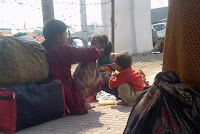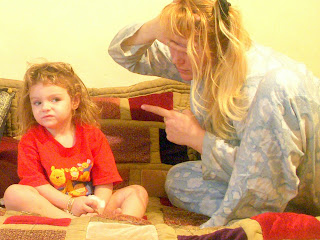
Getting
Away With It
In that other post, 3 More Mistakes Critics Make about Attachment-Parenting,
in the section about Misbehaviour, I commented briefly on that dire, threatening suggestion that there is something inherently evil in a child ‘getting away with it’
… with a note to follow up with something else to say about that.
Hi! I’m back!
The Grundies seem to believe that if a child gets what they want, they will have learned that expressing their emotions or making an attempt to accomplish something ‘works.’
Do you have any idea how many terrified-to-make-mistakes,
anxious perfectionists, afraid to learn anything new or try anything new, who
get angry at the ordinary pace of changes they’re not in control of are walking
around in unhappy adult bodies?
This ‘getting away with’ language really bothers me. This is
part of the war on children that isn’t even covert.
Or accomplishing what they’re attempting?
Or having a need satisfied?
Second, if they child does get what they want (which
is presumed to be terrible) what have they learned?
The Grundies seem to believe that if a child gets what they want, they will have learned that expressing their emotions or making an attempt to accomplish something ‘works.’
Okay. Sure. The child will learn that trying to accomplish
something works.
Oh no.
Not that.
Oh no.
Not that.
So, like trying to speak a sentence in a foreign language
and not being completely perfect, but still getting the hot dog you ordered
teaches you that doing something imperfectly is … somewhat effective. Cool.
No, no, no, it’s bad! It must be bad. Everyone everywhere is
certain that it is bad. So…
Yeah, I’m not playing.
Falsely Accused
One of the primal fears of social animals surrounds all the
feelings of being falsely accused. It is powerful stuff, our need to be
accepted and fit in. In fact, it is one of William Glasser’s Five Needs, right
after #1 Physical Security (food, shelter, sleep) --#2 Love and a Sense of
Belonging.
A need. Love and a sense of belonging is a need. When that need is frustrated . . . it feels terrible.
A need. Love and a sense of belonging is a need. When that need is frustrated . . . it feels terrible.

Being accused of having done something, or meant something, or gotten away with something wicked is a horrible feeling, connected with that very social emotion: shame.
There is a deep and dark feeling associated with being accused of ‘getting away’ with something. Of course, no one ever accuses anyone of trying to ‘get away with’ being helpful or generous or fun to be around.
Nope, this is one of the dark triad of experiences people desire to never feel again: ganged up on, falsely accused, totally ghosted. They are in that order for a reason. Those go from being terrible to traumatic to being life-altering-level terrible.
Notice how being ganged up on is actually not so bad?
Yeah.
So, when people suggest that parents are ‘letting their kids
get away with’ something, parents feel immediately hunted, haunted, and
genuinely fearful for their social safety: will they (or their children) be
ghosted, if this accusation gets to stand?
Funny, how the majority of people who say it, if confronted with what it really means, think they don’t really mean that at all.
People are like that: completely onside with whatever kind
of horrible treatment someone else deserves, until someone suggests that maybe
their dark fantasies say something about their character that they don’t really
want noticed.
Children are CHILDREN
When kids want what they want, how are they different from when adults want what they want?
Why is it bad, children wanting things?
Why would it be bad for them to get what they want, and what they need?
Where does this stuff come from? This 'it's bad to want things' and 'it's bad to attempt to get things' and 'it's monstrous to express feelings' stuff?
Is it because these unhappy (perfectionist, afraid to make a mistake, that whole list from up there...) adults were shamed for wanting? Because they were punished for expressing feelings? Because they were tormented for making mistakes?
Okay, probably . . . but what has that got to do with any child alive today?
Children are innocent of all of trespasses against their parents’ generation by anyone older than their parents, because they are the children -–not the parents of their parents. They aren’t even the overlords of their parents.
Why is it bad, children wanting things?
Why would it be bad for them to get what they want, and what they need?
Where does this stuff come from? This 'it's bad to want things' and 'it's bad to attempt to get things' and 'it's monstrous to express feelings' stuff?
Is it because these unhappy (perfectionist, afraid to make a mistake, that whole list from up there...) adults were shamed for wanting? Because they were punished for expressing feelings? Because they were tormented for making mistakes?
Okay, probably . . . but what has that got to do with any child alive today?
Children are innocent of all of trespasses against their parents’ generation by anyone older than their parents, because they are the children -–not the parents of their parents. They aren’t even the overlords of their parents.
They're children, fer cryin’ out loud!
When kids want what they want, how are they different from when adults want what they want?
 In practical terms the difference between an
adult’s desires being thwarted and a child’s is indistinguishable.
In practical terms the difference between an
adult’s desires being thwarted and a child’s is indistinguishable. What is it about those bleak feelings, of knowing that you can’t afford something, and how uncomfortable it is to have that reality made blatant by a child’s simple wishing, that makes the kids wrong for wishing?
When kids actually get what they want … ooh, surely that is bad, isn’t it?
Why?
When people win a draw for an all-inclusive vacation at
work, that’s bad, right? People shame them for ‘getting away with’ working
inattentively from time to time, and not being super nice to that creep in the
mail room…? No? Really?
Because people get right shirty about little kids getting
the candy they asked for (except at Halloween, Christmas and Easter, for some
reason no one can explain) … as if they are ‘getting away with’ something
nefarious.
Kids are really not capable of nefarious. Really. They can’t
even recognize that other people have a completely different experience of the
world from themselves until they’re at least 10…
Capable of strategizing to overthrow the adults?
Please.
We Gotta Talk About
These Vengeful Fantasies
There is something really disturbing running under the surface
of ‘children are our future’ and ‘children are so precious’ that makes otherwise
seemingly rational adults get really weird
about kids getting what they want, what they ask for, or {{horrors}} what they
need.
This all is, I think, evidence of a long-ago contract,
signed unilaterally with the universe (see the Insanity Box for more on this
idea) that had a clause in it that reads something like:
Fine. FINE! I will swallow this crap without bitching endlessly about it now, but boy, when it’s my turn, I get to do exactly the same thing to every kid this age! {shake fist at sky}
This child-abuse-provokes-abuse-of-new-children thing is
really old.
Sure, it’s not fair. Fine. You had to suck it up to survive.
Congratulations, your life sucked, your parents sucked, everything in the universe
sucked.
They did not even wish it on you.
It has nothing to do with them.
Free them from it.
Let go.
Let's All Get Some
Therapy
An adult who can look into the face of a completely innocent
child and seek revenge for what was done by the adults of their
world when they were children… that needs help. Professional help. Lots of it.
That is not mentally healthy, balanced, sensible or, frankly,
fair.
 When children get what they need, that is good.
When children get what they need, that is good. It is good in exactly the same way it was bad that the adults of today did not get what they needed when they were children. That was bad and wrong.
Children today getting what they need is good, and right.
Please stop polluting the future with the past.












